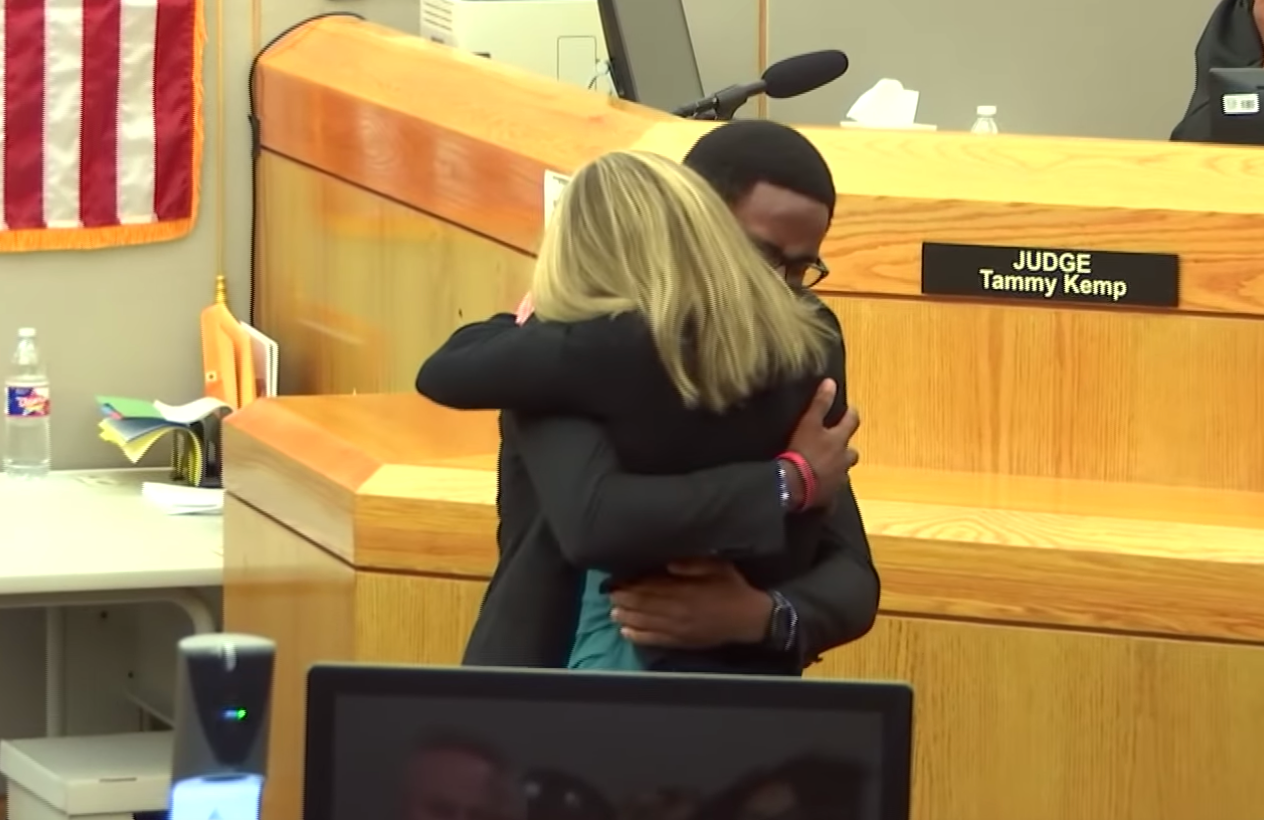The conversation about Brandt Jean’s hug of convicted murderer Amber Guyger has mostly cannibalized both the news of the (still surprising) conviction and the (not surprising at all) sentence. The image of the act is both explosive and saccharine; a molotov cocktail dipped in high fructose corn syrup.
It’s impossible to see that and not also see years of subjugation; of black people expected to forgive the behavior of violent racists; of white apology and performative reconciliation existing in place of sincere reckoning and substantive change; of the minimizing and flattening of black rage; of the pathological passivity some believe is an intentional byproduct of our reliance on and interpretation of Christianity; of the ceaseless benefit of the doubt white people, even white murderers, receive; of how white tears are weaponized to inflict harm; of this sort of forgiveness being considered by unwell-meaning whites (and blacks) to be a benchmark, an evolution, the standard; of a systemic declawing and dehumanization; of us being asked, being expected, and being demanded to possess a superhuman capacity for grace.
Suggested Reading
Of course, as Anne Branigin instructed, Brandt Jean’s very personal act maybe wasn’t intended to be political. But it’s so damn hard not to conflate the two. Especially when considering that it just felt so fucking fake. A contrived act of compassion that seemed less sincere and more spectacle; a Tony-winning performance for (white) America. As Panama Jackson noted in a conversation about this yesterday, it’s possible to forgive in silence too. When I first saw the hug, my initial visceral reaction was to reach through the screen, grab him by the neck, and snatch him the fuck away from her.
But what I keep coming back to when thinking about this and him is what I needed to do to prepare to write this. I researched Botham Jean’s murder again. As plugged in with the story as I’d been, I wasn’t quite sure about some of the facts of the case, and I needed a quick refresher—details like exactly what month and day he was murdered, which floor of the apartment complex he was on, and whether he died immediately or in a hospital. Most of the details were exactly as I remembered them, but it didn’t hurt to check.
I doubt Brandt Jean will ever have to google anything about this, though. I imagine he remembers exactly where he was when he first heard his big brother was shot. I imagine that even the most mundane and forgettable details of that day—the color of the jeans he was wearing, whether the ground was still damp from the rain that afternoon, the contents of the burrito he ordered from Chipotle—are engraved in his subconscious. I imagine that he can’t not think about that; that each time he closes his eyes he remembers what he remembers to be his brother’s voice; his brother’s feel; his brother’s face. And maybe sometimes he tries to remember and just can’t. Just goes blank. Just goes dead.
When shit like this happens—when Botham Jean or Sandra Bland or Eric Garner or Trayvon Martin or Aiyana Stanley-Jones or Antwon Rose happens—we go through the same ecosystem of emotions. We mourn. We cry. We outrage. We protest. We march. We shout. We hashtag. We organize. We break things. We (try to) change things. And then, the news eventually fades—as do all those feelings with it—and we go on with our lives. We don’t forget, of course. But it doesn’t stay all-consuming. It just can’t. We have to live too.
Brandt Jean doesn’t have that luxury. It just ain’t as easy to “live too” when it’s your people—your person—who’s been snatched away. He’s the one who had to find a way to live, to breathe, in the space between the times the country was thinking about his brother again. And maybe, maybe, Brandt Jean already tried the scorched earth thing. Maybe he already tried the “fuck her, forever” thing. Maybe he already tried the seething rage thing. Maybe, in that vast span of time that we weren’t looking at him and thinking about his brother and dissecting his behavior, he had already circled through the feelings we believe he should currently possess. And maybe he chose this sort of forgiveness because the other way was paralyzing and metastasizing. Maybe he chose to honor his dead brother this way because he concluded that it’s the only way he could stay alive. Maybe he needed to do this so his mother would only be without one son, not two.
I ain’t suggesting that forgiveness is some sort of aspiration or proof of evolution. It ain’t. (At least not to me.) It’s just a thing a person might need to possess to see another day. To just maybe want to see another day. I don’t think I’d need to do that to move on, but I don’t know. It ain’t my brother who was murdered.
Straight From 
Sign up for our free daily newsletter.


